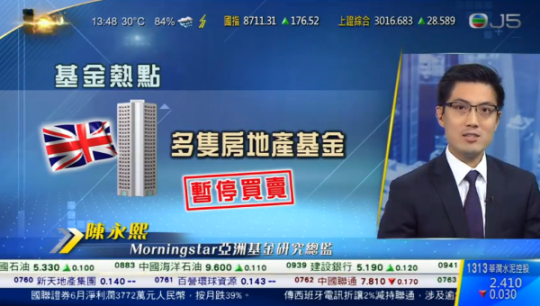Asset management firms have halted trading in U.K. real estate funds after the U.K. voted to leave the European Union. How would this affect investors? Wing Chan, director of manager research, Asia, for Morningstar shared his views in an interview with TVB.

Q: At least nine U.K. real estate funds halt trading since Brexit vote. Can you walk us through what is happening?
Chan: Market has been volatile in the past few weeks since the referendum. Amid fear of a possible drop in property prices as a reaction to the referendum, a wave of investors is asking for their money back in a short time. A common feature among these real estate funds is that they mainly hold physical assets such as commercial buildings. And it obviously takes time to sell properties for cash. With a large number of redemption requests, the fund managers have no choice but to suspend trading.
Q: So, these funds would have been able to meet the redemption requests under normal circumstances?
Chan: Yes. The situation is, holding too much cash can hurt a fund's return; while in a volatile market which could lead to huge redemption requests, holding too little cash can cause problems. But we believe that the real issue here is, a real estate fund that mainly holds physical assets is not suitable for providing daily liquidity.
Q: According to the Sunday Telegraph newspaper, The Bank of England is considering curbs on withdrawals from these funds. The paper said that the BoE was considering "enforced notice periods before redemptions, slashing the price for investors who rush to the door, or additional liquidity requirements for funds". Do you think these measures would help?
Chan: Yes, I think these measures would help. As I said, these real estate funds owned physical assets and selling of properties takes time, enforcing notice periods before redemptions definitely helps. Again, in our perspective, the biggest problem is these funds should not offer daily redemption. Most real estate funds that hold physical assets in Hong Kong or elsewhere are closed-end funds -- you put your money in the fund today, and then you could only take your cash back after seven or 10 years. It connects the liquidity between the fund and its physical assets better. Fund companies could better prepared for the redemption requests by selling their assets prior to maturity.
Q: As Brexit shock deepens, should we worry about other funds suspended?
Chan: Such risk in the Hong Kong retail fund market is relatively low. Among the 2,000 or so funds authorised by the Securities and Futures Commission, most holds securities instead of physical assets, thus are high liquidity funds.
Q: Let us now switch to another recent hot topic -- bond funds. According to the Hong Kong Investment Funds Association, bond fund recorded net sales of 1.638 billion USD in May, a number far higher than other funds types. What makes bond funds so popular in the past months?
Chan: I think investors generally have low risk appetite recently. From the circuit breaker mechanism that shocks the China and Hong Kong markets in Q1, to the Brexit referendum in the second half of Q2 – these all brought down their risk appetite. Bond funds, especially those with investment grades and longer maturity had outperformed with this sentiment.
















